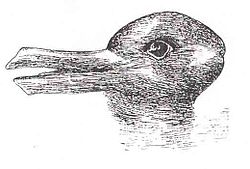Epistemology
Epistemology
| The black swan symbolizes one of the historical problems of epistemology: if all the swans we have seen so far are white, can we decide that all the swans are white? Really? |
|
| Kuhn used optical illusion to demonstrate how a paradigm shift can cause a person to see the same information in a completely different way: which animal is the one here aside? Sure? |
Epistemology (from the Greek ἐπιστήμη, epistēmē, meaning "certain knowledge" or "science", and λόγος, logos, "discourse") represents that branch of philosophy dedicated to the study of the necessary conditions for acquiring scientific knowledge and the methods through which such knowledge can be achieved.[1] This term specifically refers to that section of gnoseology that investigates the foundations, the validity, and the limits of scientific knowledge. In English-speaking countries, the concept of epistemology is commonly employed almost as a synonym for gnoseology or theory of knowledge, that is, the discipline that examines the study of knowledge in general.
It is important to emphasize that the central problem of epistemology, today as in the times of Hume, is the issue of verifiability.[2][3]
The Hempel's paradox asserts that the observation of every white swan provides support to the statement that all ravens are black;[4] in other words, every example that does not contradict the theory confirms a part of it. According to this paradox:
According to the criterion of falsifiability, no theory can be considered definitively true, as although there is only a finite number of experiments that can confirm it, theoretically there is an infinite number of experiments that could refute it.[5]
|
But it’s not all so obvious... |
...because the very concept of epistemology meets continuous implementations, like in medicine:
|
|
- ↑ The term is believed to have been coined by the Scottish philosopher James Frederick Ferrier, in his Institutes of Metaphysic (p.46), of 1854; see Internet Encyclopedia of Philosophy, James Frederick Ferrier (1808—1864).
- ↑ David Hume (Edimburgo, 7 maggio 1711[1] – Edimburgo, 25 agosto 1776) was a Scottish philosopher. He is considered the third and perhaps the most radical of the British Empiricists, after the Englishman John Locke and the Anglo-Irish George Berkeley.
- ↑ Srivastava S, «Verifiability is a core principle of science», in Behav Brain Sci, Cambridge University Press, 2018, Cambridge».
DOI:10.1017/S0140525X18000869 Jan;41:e150. - ↑ Here we obviously refer to the well-known paradox called "of the crows", or "of the black crows", formulated by the philosopher and mathematician Carl Gustav Hempel, better explained in Wikipedia's article Raven paradox:
See Good IJ, «The Paradox of Confirmation», in Br J Philos Sci, 1960 – in «Vol. 11». - ↑ Evans M, «Measuring statistical evidence using relative belief», in Comput Struct Biotechnol J, 2016».
DOI:10.1016/j.csbj.2015.12.001 Jan 7;14:91-6. - ↑ Amrhein V, Greenland S, McShane B, «Scientists rise up against statistical significance», in Nature, 2019».
DOI:10.1038/d41586-019-00857-9 Mar;567(7748):305-307. - ↑ Rodgers JL, «The epistemology of mathematical and statistical modeling: a quiet methodological revolution», in Am Psychol, 2010».
DOI:10.1037/a0018326 Jan;65(1):1-12. - ↑ Meehl P, «The problem is epistemology, not statistics: replace significance tests by confidence intervals and quantify accuracy of risky numerical predictions», 1997». , in eds Harlow L. L., Mulaik S. A., Steiger J. H., What If There Were No Significance Tests? - editors. (Mahwah: Erlbaum, 393–425. [Google Scholar]
- ↑ Sprenger J, Hartmann S, «Bayesian Philosophy of Science. Variations on a Theme by the Reverend Thomas Bayes», Oxford University Press, 2019, Oxford».
- ↑ Wasserstein RL, Schirm AL, Lazar NA, «Moving to a World Beyond p < 0.05», in Am Stat, 2019».
DOI:10.1080/00031305.2019.1583913 73, 1–19. - ↑ Dettweiler Ulrich, «The Rationality of Science and the Inevitability of Defining Prior Beliefs in Empirical Research», in Front Psychol, 2019».
DOI:10.3389/fpsyg.2019.01866 Aug 13;10:1866. - ↑ European Union, Horizon 2020
- ↑ Boon M, Van Baalen S, «Epistemology for interdisciplinary research - shifting philosophical paradigms of science», in Eur J Philos Sci, 2019».
DOI:10.1007/s13194-018-0242-4 9(1):16. - ↑ Boon M, «An engineering paradigm in the biomedical sciences: Knowledge as epistemic tool», in Prog Biophys Mol Biol, 2017».
DOI:10.1016/j.pbiomolbio.2017.04.001 Oct;129:25-39.



